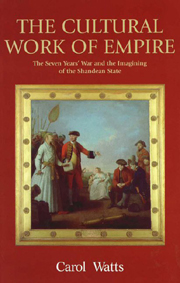Book contents
- Frontmatter
- Contents
- Acknowledgements
- List of Illustrations
- Abbreviations
- INTRODUCTION: THE CULTURAL WORK OF EMPIRE
- 1 LUNACY IN THE COSMOPOLIS (1759): EXPANSION AND IMPERIAL RECOIL
- 2 PATRIOT GAMES: MILITARY MASCULINITY AND THE RECOMPENSE OF VIRTUE
- 3 PRICKSONGS IN GOTHAM: OR, THE SEXUAL OECONOMY OF STATE IMAGINING
- 4 FRIENDSHIP, SLAVERY AND THE POLITICS OF PITY, INCLUDING A VISIT FROM PHILLIS WHEATLEY
- 5 WOMEN'S TIME AND WORK-DISCIPLINE: OR, THE SECRET HISTORY OF ‘POOR MARIA’
- 6 ‘BRAMIN, BRAMINE’: STERNE, ELIZA DRAPER AND THE PASSAGE TO INDIA
- 7 CONCLUDING ALONG SHANDEAN LINES
- Bibliography
- Index
5 - WOMEN'S TIME AND WORK-DISCIPLINE: OR, THE SECRET HISTORY OF ‘POOR MARIA’
Published online by Cambridge University Press: 12 September 2012
- Frontmatter
- Contents
- Acknowledgements
- List of Illustrations
- Abbreviations
- INTRODUCTION: THE CULTURAL WORK OF EMPIRE
- 1 LUNACY IN THE COSMOPOLIS (1759): EXPANSION AND IMPERIAL RECOIL
- 2 PATRIOT GAMES: MILITARY MASCULINITY AND THE RECOMPENSE OF VIRTUE
- 3 PRICKSONGS IN GOTHAM: OR, THE SEXUAL OECONOMY OF STATE IMAGINING
- 4 FRIENDSHIP, SLAVERY AND THE POLITICS OF PITY, INCLUDING A VISIT FROM PHILLIS WHEATLEY
- 5 WOMEN'S TIME AND WORK-DISCIPLINE: OR, THE SECRET HISTORY OF ‘POOR MARIA’
- 6 ‘BRAMIN, BRAMINE’: STERNE, ELIZA DRAPER AND THE PASSAGE TO INDIA
- 7 CONCLUDING ALONG SHANDEAN LINES
- Bibliography
- Index
Summary
The only possible Means of preventing a Rival Nation from running away with your Trade, is to prevent your own People from being more idle and vicious than they are … So the only War, which can be attended with Success in this Respect, is a War against Vice and Idleness; a War, whose Forces must consist of – not Fleets and Armies – but such judicious Taxes and Wise Regulations, as will turn the Passion of private Self-Love into the Channel of Public Good.
Imperial competition was the most aggressive of enterprises, even in times of peace. For Josiah Tucker, a pacifist during the Seven Years' War in the name of le doux commerce, the war at stake was an internal one, to be welcomed in its rigorous conquest of the domestic population. If the realm of sociable commerce made such an imperative palatable through the forms of affective ‘reciprocity’ I have been exploring, it nevertheless could seem a war in all but name. It had, to continue the metaphor, its casualties and deserters, as well as its enemies within. And central to its campaign was the regulation of time: in particular, women's time, which appeared at once to be a cause of, and antidote to, the widespread ‘Vice and Idleness’ Tucker deplored. This chapter considers the relation of ‘women's time’ to the state imagining of the 1760s and 1770s, by tracking the fortunes of one popular sentimental image, Sterne's ‘Poor Maria’, across the social landscape of the period.
- Type
- Chapter
- Information
- The Cultural Work of EmpireThe Seven Years' War and the Imagining of the Shandean State, pp. 197 - 246Publisher: Edinburgh University PressPrint publication year: 2007



